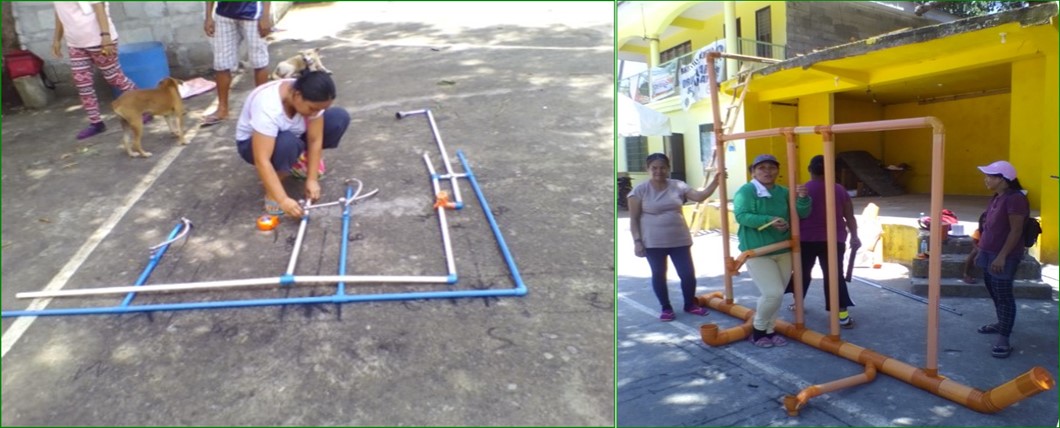 Photos show the women of Almeria, Biliran, trained by the Technical Education and Skills Development Authority on plumbing and masonry, putting into use their newly-learned skills in continuity for the water system project funded by the Kapit-Bisig Laban sa Kahirapan-Comprehensive and Integrated Delivery of Social Services.
Photos show the women of Almeria, Biliran, trained by the Technical Education and Skills Development Authority on plumbing and masonry, putting into use their newly-learned skills in continuity for the water system project funded by the Kapit-Bisig Laban sa Kahirapan-Comprehensive and Integrated Delivery of Social Services.As part of its continued thrust to institutionalize gender and development (GAD), the Department of Social Welfare and Development (DSWD) Field Office (FO) VIII partnered with the Technical Education and Skills Development Authority (TESDA) to train women on skills that are considered as fit only for men.
Recently given a special citation by the Philippine Commission on Women and the National Anti-Poverty Commission, DSWD FO VIII’s GAD best practice provided livelihood skills training to the women- beneficiaries of the Kapit-Bisig Laban sa Kahirapan-Comprehensive and Integrated Delivery of Social Services (Kalahi-CIDSS) of Almeria, Biliran on plumbing and masonry.
Kalahi-CIDSS: a program for empowerment
KALAHI-CIDSS is one of the DSWD’s poverty alleviation programs which utilizes the community driven development (CDD) approach. It provides communities with the opportunity to identify sub-projects needed by their community, and later on manage its implementation once approved or funded.
As a CDD approach, the focus is to empower the community members in the decision making process, as well as in the implementation of the sub-projects where they have their own roles to play. However, there are cases when prejudice towards the involvement of women in the construction of the sub-projects still prevail.
Addressing gender stereotyping in Almeria
The KALAHI-CIDSS program aims to break this stereotyping of women by advocating gender mainstreaming in all projects’ components, processes, and activities.
In Almeria, it was noted that the participation of women, especially in the implementation of sub-projects was low as construction work was seen to be the role of men.
Hence, the DSWD, together with the local government unit (LGU) of Almeria forged a partnership agreement with TESDA on empowering women through non-traditional skills training which started in 2019.
The partnership provided interested women, with capacity building and scholarship grants on plumbing and masonry training. The training was conducted by the Cabucgayan Vocational School in Biliran, one of TESDA’s accredited training institutions. All the trainees passed the National Competencies Level II (NC II) Exam administered by TESDA. They have demonstrated competence in all units of competency and became certified plumbers in their barangay.
Meanwhile, the KALAHI-CIDSS Field Office VIII and the LGU of Almeria worked hand-in-hand to build tactical partnership and strategic alliance with agencies, academe, civil society organizations, and the private sector to help the women find venues to apply their skills.
Increased women participation in Kalahi-CIDSS implementation
The KALAHI-CIDSS program was the first to hire the women-trainees for the completion of the sub-projects in Barangay Pili. They assisted in the construction of the community-identified water system and drainage canal projects in the community. Along with their male counterparts, they were paid PHP 38.12 / hour or PHP 305.00 / day for the construction of the water system and drainage canal.
With the involvement of the trained women in the construction, the water system was completed nine days in advance while the drainage canal was constructed 31 days ahead of the scheduled completion date.
Significantly, the number of female workers involved in Kalahi-CIDSS project implementation increased, helping achieve the program’s ideal target of 85% participation rate of all community members.
Lolinda Bagdoc, one of the TESDA scholars said, “Sa training, nahibalo ko pandugtong sa mga hose. Daghan among nakan-onan.” [In this training I learned how to connect the hosepipes. I learned a lot.]
To date, with their certification from TESDA, the trained women are now considered professionals in the field of plumbing and masonry. They are now applying their skills in improving their own homes and in maintaining their KALAHI-CIDSS sub-projects.
At a higher level, the DSWD is working with the LGU of Almeria to find more avenues for these women to be mainstreamed in the labor force through the Public Employment Service Office. ###



